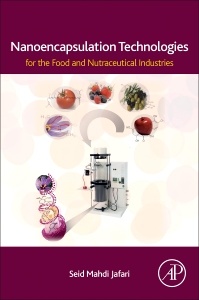Nanoencapsulation Technologies for the Food and Nutraceutical Industries
Coordonnateur : Jafari Seid Mahdi

Nanoencapsulation Technologies for the Food and Nutraceutical Industries is a compendium which collects, in an easy and compact way, state-of-the-art details on techniques for nanoencapsulation of bioactive compounds in food and nutraceutical industries.
The book addresses important modern technologies, including biopolymer based nano-particle formation techniques, formulation based processes, such as nano-liposomes and nano-emulsions, process based nano-encapsulation, such as electro-spinning and nano-spray drying, natural nano-carrier based processes, like casein and starch nano-particles, and other recent advances.
This definitive reference manual is ideal for researchers and industry personnel who want to learn more about basic concepts and recent developments in nanotechnology research.
1. An overview of nanoencapsulation techniques and their classification
Part One: Lipid-Formulation Based Nanoencapsulation Technologies 2. Encapsulation by nanoemulsions 3. Encapsulation by nanoliposomes 4. Encapsulation by nanostructured lipid carriers
Part Two: Natural Nanocarrier-Based Nanoencapsulation Technologies 5. Nanocapsule formation by caseins 6. Nanocapsule formation by nanocrystals 7. Nanocapsule formation by cyclodextrins
Part Three: Nanoencapsulation Technologies Based on Special Equipment 8. Nanocapsule formation by electrospinning 9. Nanocapsule formation by electrospraying 10. Nanocapsules formation by nano spray drying
Part Four: Nanoencapsulation Technologies Based on Biopolymer Nanoparticles 11. Nanocapsule formation by individual biopolymer nanoparticles 12. Nanocapsule formation by complexation of biopolymers
Part Five: Bioavailability, Characterization, and Safety of Nano-Encapsulated Ingredients 13. Bioavailability and release of bioactive components from nanocapsules 14. Instrumental analysis and characterization of nanocapsules 15. Safety and regulatory issues of nanocapsules
- Serves as a compendium of recent techniques and systems for nanoencapsulation of bioactive compounds
- Brings together basic concepts and the potential of nanoencapsulation technologies, also including their novel applications in functional foods and nutraceutical systems
- Includes biopolymer based nano-particle formation techniques, formulation based processes, process based nanoencapsulation, and nano-carrier based process
Date de parution : 04-2017
Ouvrage de 636 p.
15x22.8 cm
Thèmes de Nanoencapsulation Technologies for the Food and... :
Mots-clés :
anticarcinogenic activity; antimicrobial activity; bioactive components; bioactive compounds; bioactives; bioavailability; biocompatible nanoparticles; casein; classification; coaxial-electrospinning; complex coacervation; controlled release; cyclodextrin; delivery system; desolvation; digestion; double emulsions; electrospinning; electrospraying; electrostatic precipitator; encapsulation; flavonoids; food; functional drinks; functional properties; gastrointestinal; hydrophilic and hydrophobic bioactives; in vitro; in vivo; inclusion complex; instrumental analysis; lipid nanocarriers; microemulsions; modeling; nanocapsules; nanocarrier; nanocrystals; nanoemulsions; nanoencapsulation; nanofibers; nanoliposomes; nanoparticle; nanoprecipitation; nanospray drying; nanosuspensions; nanotechnology; nutraceutical delivery; nutraceuticals; nutrients; particle characteristics; particle morphology; particle size; physicochemical properties; phytosomes; polysaccharide; process optimization; proliposomes; protein; release; safety; spray drying; toxicity; vibrating mesh technology; well-being



